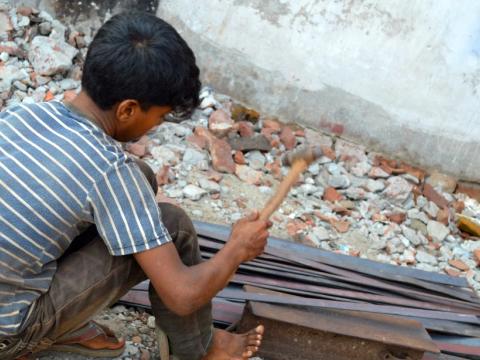Survival itself is lamentation

If we look back at our lives, it’s hard to remember each and every single day. But there are days that are unforgettable. They flash us back to our childhood. Sometimes, the days that are the most unforgettable are the ones that remind us just how lucky we are.
He earns 150 BDT (about USD $2) for his weekly wage.
Last month I met Sakib*, a 12-year-old boy who works in a hard metal shop in Khulna, Bangladesh, for his survival.
He does many jobs – shaping metal with a hammer and odd jobs like fetching tea for the owner and cleaning the shop. Even though he is young, he does the work of an adult blacksmith.
It’s about the opposite of my childhood.
When I was a girl, I remember lamenting for different petty things like chocolates, toys, candy, or balloons. But I never lamented over my survival.
Sakib’s father abandoned them about three years ago, and the family fell into a deep sea of despair.
His mother is engaged in different odd jobs like washing clothes, cleaning dishes and floors as a maid servant in her neighbours’ houses, from which she earns 2000 BDT (about USD $26) per month. Sakib’s younger brother is 10-years-old and currently stays at a madrasa (religious school) as his mother cannot afford to bear his expenses.
Sakib studied until Grade 4 but his destiny did not seem to be supportive of education.
Some years ago, I read J. M. Synge’s Riders to the Sea where I learned that fate is sometimes inevitable and sometimes we must be satisfied. I would not have realized the true meaning of that theme if I had not met Sakib.
Sakib’s dream was shattered in the blink of an eye with the sound of the hammer.
He abandoned his education and started working as a blacksmith’s helper as it was impossible for his mother to afford two meals a day for her two sons, plus house rent and educational expenses.
He’s worked in the blacksmith’s shop for the past two years. He must do welding without any appropriate safety equipment. His hands are now unrecognizable, becoming hard with lots of scars and wounds.
Sakib works at least 10 hours a day, six days of a week. He earns 150 BDT (about USD $2) for his weekly wage.
He says, “I have to work under continuous risk of losing my eyes, hands or maybe my whole life. I am quite aware of it. It is also even known to me that my compensation is not sufficient to manage three meals for me and my mother.”
The family pays 400 BDT (about USD $5) a month to live in a small hut without electricity or water. Sakib and his mother work hard, but they are uncertain about their future.
He says, “I do not know what will happen to me and my mother if one of us becomes sick but we are just running and struggling each day to have food and nothing else.”
Now I just dream to sustain the existence of my family.
When I asked Sakib if he has a dream for his future, he answered with a feigning smile, “Once I dreamt to be a government official to serve the country and make a bright future for my family, but now I just dream to sustain the existence of my family.”
He also mentioned his desires to study at least to Grade 8 through night school.
As we continued our conversation, I was in a fix thinking of what I should say to him. What could transform the feigning smile to a real one?
Then I thought; there are many Sakib’s in our country who are struggling everyday. They are far away from a real childhood; they’ve never seen a glimpse of childhood. Their survival is more like a lamentation, a lamentation for hope, and a lamentation for dreams.
After meeting Sakib, I was reminded of the small things I lament about, but now I have a bigger lamentation to God. I pray that someday all the children like Sakib will live life in all it’s fullness and enjoy the innocence and fragrance of their childhood, so that I will be able to say with peaceful heart,
“And I made a rural pen, And I stained the water clear, And I wrote my happy songs, Every child may joy to hear.” - William Blake, Songs of Innocence
Sakib* - name changed to protect identity
About the author | Richa Silvia Biswas is a writer, photographer and advocacy specialist for World Vision Bangladesh.